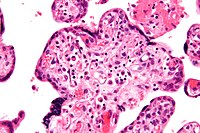
Photo from wikipedia
Citrin deficiency causes neonatal intrahepatic cholestasis (NICCD), failure to thrive and dyslipidemia (FTTDCD), and adult‐onset type II citrullinemia (CTLN2). Owing to a defect in the NADH‐shuttle, citrin deficiency impairs hepatic… Click to show full abstract
Citrin deficiency causes neonatal intrahepatic cholestasis (NICCD), failure to thrive and dyslipidemia (FTTDCD), and adult‐onset type II citrullinemia (CTLN2). Owing to a defect in the NADH‐shuttle, citrin deficiency impairs hepatic glycolysis and de novo lipogenesis leading to hepatic energy deficit. To investigate the physiological role of citrin, we studied the growth of 111 NICCD‐affected subjects (51 males and 60 females) and 12 NICCD‐unaffected subjects (five males and seven females), including the body weight, height, and genotype. We constructed growth charts using the lambda‐mu‐sigma (LMS) method. The NICCD‐affected subjects showed statistically significant growth impairment, including low birth weight and length, low body weight until 6 to 9 months of age, low height until 11 to 13 years of age, and low body weight in 7 to 12‐year‐old males and 8‐year‐old females. NICCD‐unaffected subjects showed similar growth impairment, including low birth weight and height, and growth impairment during adolescence. In the third trimester, de novo lipogenesis is required for deposition of body fat and myelination of the developing central nervous system, and its impairment likely causes low birth weight and length. The growth rate is the highest during the first 6 months of life and slows down after 6 months of age, which is probably associated with the onset and recovery of NICCD. Adolescence is the second catch‐up growth period, and the proportion and distribution of body fat change depending on age and sex. Characteristic growth impairment in citrin deficiency suggests a significant role of citrin in the catch‐up growth via lipogenesis.
Journal Title: Journal of Inherited Metabolic Disease
Year Published: 2019
Link to full text (if available)
Share on Social Media: Sign Up to like & get
recommendations!